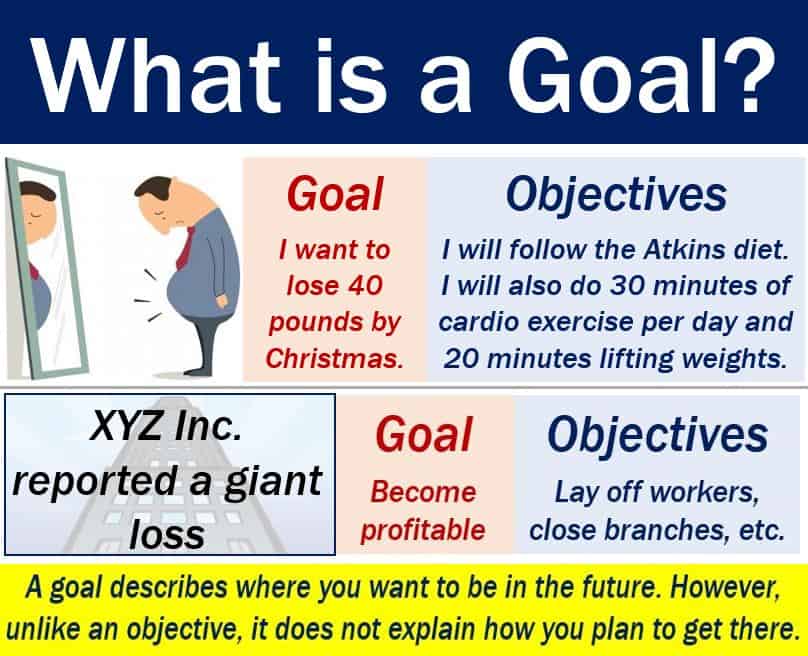Goal – definition and meaning
A Goal, in business, describes what a company expects or hopes to accomplish over a specific period. In other words, where it hopes to be at a future date. Setting clear business goals is crucial for defining a company’s direction and measuring its progress toward strategic success.
People commonly use the term ‘business goal‘ with the same meaning. On a personal level, a goal is an idea of a desirable or future result that people envision, plan, and commit to achieving. We commonly endeavor to reach goals over specific periods by setting deadlines.
Sports
In sports, a goal consists of two posts and a crossbar, often with a net in between. In the following sports, competitors try to score goals: soccer (British: football), hockey, basketball, water polo, handball, lacrosse, rugby, netball, floorball, and polo.
Also in sports, the term refers to the score. For example, Team A beat Team B by two goals to one. The players aim to score goals.
This article focuses on the term with its business meaning.
Part of a business plan
Most companies have details on their goals and objectives in their business plan. A business plan is a formal document that outlines a company’s goals, objectives, strategies, and financial forecasts.
Not only do whole companies have goals, but also departments, employees, customers, and other parts of a commercial enterprise. They are essential for providing guidance and a unified direction for people in the organization, aligning their efforts toward achieving a common outcome.

When somebody agrees with their employer what they would like to achieve in their job, they set goals. As with company goals, the aim is to accomplish the achievements over a specific period.
Employees and employers commonly set goals during appraisals. Appraisals are meetings in which employers and employees discuss employee performance.
According to BusinessDictionary.com, a goal is:
“An observable and measurable end result having one or more objectives to be achieved within a more or less fixed time frame.”
A goal vs. an objective
We often hear the term ‘goals and objectives‘ in business. So, we logically assume that the two terms have the same meaning. Although they are very similar, their meanings are not the same.
Knowing what their meanings are can help us use them effectively. In other words, understanding their difference can help us get from where we are to where we want to go.
When we plan our company’s future, we generate a list of things we would like it to reach. These are goals. The steps we take to get there, however, are our objectives.
-
‘Goal states’ how you want it to be or become
Let’s suppose you are a member of the board of a company that is making heavy losses. Your goal is to make the company profitable.
However, the goal does not specify what steps the board will take to reach profitability.
-
‘Objective’ states how you plan to get there
The steps your company plans to take are its objectives. For example, the company may lay off workers and close some branches. It may also stop making and selling its unprofitable or least profitable products.
If you are overweight, your goal might be to lose twenty pounds. Your objectives include details on a diet and exercise regime you plan to follow. In your plan, you will also have a time frame and possibly deadlines.
Goal – vocabulary and concepts
There are many terms in business English that contain the word “goal.” Let’s take a look at some compound words, their meanings, and how we can use them in a sentence:
-
Goal-driven
Motivated by the desire to achieve specific objectives, often used to describe a person or organizational culture.
Example: “The company’s goal-driven approach has led to significant increases in productivity and efficiency.”
-
Goal alignment
The process of ensuring that individual, team, and organizational goals are in sync and support each other.
Example: “Goal alignment sessions are crucial to ensure that all departments are working towards the same corporate objectives.”
-
Goal management
The practice of setting, monitoring, and achieving goals within an organization.
Example: “Effective goal management involves regular progress checks and adjustments to strategies.”
-
Goal achievement
The act of successfully reaching a set goal or objective.
Example: “The award was given in recognition of her exceptional goal achievement in sales this year.”
-
Strategic goals
Long-term objectives that are aligned with the overall vision and strategy of an organization.
Example: “The board outlined the strategic goals for the next five years, focusing on growth and innovation.”
-
Operational goals
Short-term objectives that are specific, measurable, and designed to improve the day-to-day operations of a business.
Example: “The manager set new operational goals to improve customer service response times.”
-
Financial goals
Objectives related to the financial performance or health of an organization or individual.
Example: “Setting clear financial goals is key for the company’s long-term profitability.”
-
Performance goals
Objectives set to evaluate and improve the performance of an individual or team within a business.
Example: “During her review, her manager set several performance goals for the coming year.”
Two Educational Videos
These two interesting video presentations, from our sister YouTube channel – Marketing Business Network, explain what ‘Goal’ and ‘Objective’ are using simple, straightforward, and easy-to-understand language and examples.
-
What is a Goal?
-
What is an Objective?

